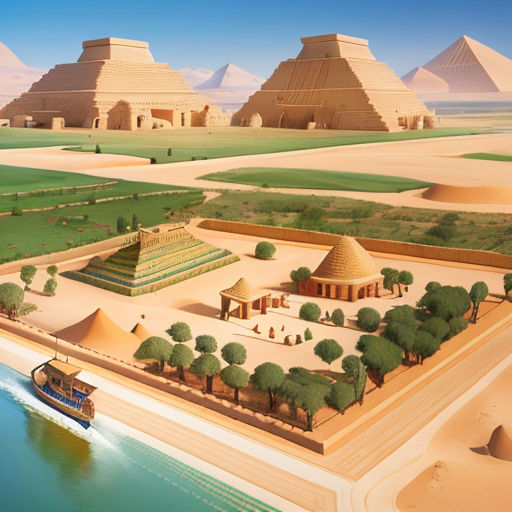
The Rise of Eridu
By Rameena

01 Aug, 2023

The Sumerian civilization was one of the earliest urban societies in Mesopotamia, located in present-day southern Iraq. It emerged around 4500 BCE and thrived until around 1900 BCE. The Sumerian people were highly innovative and developed many significant achievements that laid the foundation for future civilizations. Their advancements in agriculture, writing, mathematics, religion, and architecture have had a lasting impact on human history. This is the story of the remarkable Sumerian civilization and its enduring legacy.

The Sumerians were adept farmers who utilized the rich soil of the Tigris and Euphrates rivers to cultivate crops such as barley, wheat, and dates. They developed irrigation systems to control water flow and built canals to transport goods and produce. This agricultural surplus led to a division of labor, enabling the growth of specialized crafts and the emergence of cities. As urban centers expanded, city-states like Uruk, Ur, and Lagash came into existence, each with its own ruler and unique character.

One of the most remarkable achievements of the Sumerians was the development of writing. They invented cuneiform, one of the earliest known writing systems, using a stylus to make wedge-shaped marks on clay tablets. Cuneiform allowed for the recording of information, trade records, legal documents, and literary works. The epic of Gilgamesh, a fascinating mythological tale, was among the notable literary contributions of the Sumerians. This early form of writing laid the groundwork for future writing systems and facilitated the spread of knowledge.

Another significant aspect of Sumerian civilization was their impressive advancements in mathematics. They used a sexagesimal numeral system based on the number 60, which influenced our modern way of measuring time and angles. The Sumerians developed mathematical calculations, including multiplication, division, and square and cube roots. Their mathematical knowledge was necessary for architectural and engineering projects, such as the construction of ziggurats, monumental stepped towers that served as religious centers.

Religion played a crucial role in the lives of the Sumerians. They worshiped a pantheon of gods and goddesses, each representing different aspects of life and natural forces. Temples called ziggurats served as places of worship and were believed to connect heaven and earth. The priests acted as intermediaries between the people and the gods, conducting rituals, offering sacrifices, and interpreting signs and omens. The Sumerians believed that their gods controlled every aspect of their lives, from the natural world to social order and daily activities.

Sumerian architecture also left an indelible mark on history. They built magnificent palaces, temples, and city walls using mud bricks. The ziggurats, with their terraced levels and dedicated spaces for religious ceremonies, stood as awe-inspiring structures. The city of Ur, for example, featured the Great Ziggurat of Ur, a massive stepped pyramid that dominated the landscape. The Sumerians' architectural achievements showcased their ingenuity and skill in construction.

Trade was an integral part of Sumerian civilization, allowing for the exchange of goods and ideas with neighboring regions. They engaged in long-distance trade, transporting goods such as textiles, metals, and agricultural produce using boats and donkeys. The Sumerians established trade routes that connected Mesopotamia with the Indus Valley, Egypt, and Anatolia. This exchange of goods and cultural influences fostered economic growth and societal development.

While the Sumerians flourished for over two thousand years, their civilization eventually declined due to various factors. Environmental challenges, such as droughts and floods, harmed agricultural productivity. Internal conflicts between city-states led to power struggles, weakening their collective unity. Additionally, external invasions from neighboring civilizations, such as the Akkadians and Amorites, contributed to the downfall of Sumerian dominance.

Nevertheless, the Sumerian civilization left behind an extraordinary legacy that influenced subsequent societies in Mesopotamia and beyond. Their innovations in writing, mathematics, agriculture, and architecture formed the basis for future civilizations, including the Akkadian, Babylonian, and Assyrian empires. The concepts of city-states, trade networks, and religious practices established by the Sumerians became integral to the development of human civilization as a whole.

In conclusion, the story of the Sumerian civilization represents a remarkable chapter in human history. Through their agricultural expertise, invention of writing, mathematical knowledge, religious beliefs, and architectural prowess, the Sumerians laid the foundation for future civilizations to thrive. Their contributions continue to resonate in the present day, reminding us of the enduring impact of this ancient civilization.